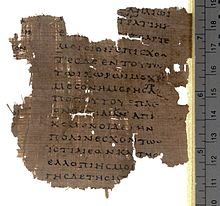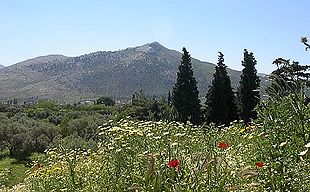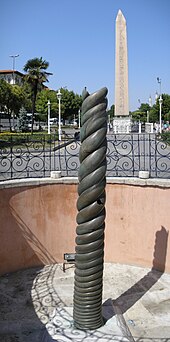Histories (Herodotus)
 Fragment from Histories, Book VIII on 2nd-century Papyrus Oxyrhynchus 2099 | |
| Author | Herodotus |
|---|---|
| Language | Ancient Greek |
| Genre | History |
| Publisher | Various |
Publication date | c. 440 BCE |
| Publication place | Greece |
The Histories (Template:Lang-el; Greek pronunciation: [his.to.rí.ai̯]; also known as The History[1]) of Herodotus is now considered the founding work of history in Western literature.[2] Written in 440 BC in the Ionic dialect of classical Greek, The Histories serves as a record of the ancient traditions, politics, geography, and clashes of various cultures that were known in Western Asia, Northern Africa and Greece at that time.[citation needed] Although not a fully impartial record, it remains one of the West's most important sources regarding these affairs. Moreover, it established the genre and study of history in the Western world (despite the existence of historical records and chronicles beforehand).
The Histories also stands as one of the first accounts of the rise of the Persian Empire, as well as the events and causes of the Greco-Persian Wars between the Achaemenid Empire and the Greek city-states in the 5th century BC. Herodotus portrays the conflict as one between the forces of slavery (the Persians) on the one hand, and freedom (the Athenians and the confederacy of Greek city-states which united against the invaders) on the other.
The Histories was at some point divided into the nine books that appear in modern editions, conventionally named after the nine Muses.
Motivation for writing
Herodotus seems to have traveled extensively around the ancient world, nearly all these territories were directly under the Persian Empire, conducting interviews and collecting stories for his book. At the beginning of The Histories, Herodotus sets out his reasons for writing it:
This is the showing-forth of the inquiry of Herodotus of Halicarnassus, so that neither what has come to be from man in time might become faded, nor that great and wondrous deeds, those shown forth by Greeks and those by barbarians, might be without their glory; and together with all this, also through what cause they warred with each other.
Storyline

Book I (Clio)
- The rapes of Io, Europa, and Medea, which motivated Paris to abduct Helen. The subsequent Trojan War is marked as a precursor to later conflicts between peoples of Asia and Europe. (1.1–5)[3]
- Colchis, Colchians and Medea. (1.2.2–1.2.3)
- The rulers of Lydia (on the west coast of Asia Minor, today modern Turkey): Candaules, Gyges, Sadyattes, Alyattes, Croesus (1.6–7)
- How Gyges took the kingdom from Candaules (1.8–13)
- The singer Arion's ride on the dolphin (1.23–24)
- Solon's answer to Croesus's question that Tellus was the happiest person in the world (1.29–33)
- Croesus's efforts to protect his son Atys, his son's accidental death by Adrastus (1.34–44)
- Croesus's test of the oracles (1.46–54)
- The answer from the Oracle of Delphi concerning whether Croesus should attack the Persians (famous for its ambiguity): If you attack you will destroy a great empire.
- Peisistratos' rises and falls from power as tyrant of Athens (1.59–64)
- The rise of Sparta (1.65–68)

Edwin Long's 1875 interpretation of The Babylonian Marriage Market as described by Herodotus in Book 1 of the Histories - Croesus's defeat by Cyrus II of Persia, and how he later became Cyrus's advisor (1.70–92)
- The rulers of the Medes: Deioces, Phraortes, Cyaxares, Astyages, Cyrus II of Persia (1.95–144)
- The rise of Deioces over the Medes
- Astyages's attempt to destroy Cyrus, and Cyrus's rise to power
- Harpagus tricked into eating his son, his revenge against Astyages by assisting Cyrus
- The culture of the Persians
- The history and geography of the Ionians, and the attacks on it by Harpagus
- Pactyes' convinces the Lydians to revolt. Rebellion fails and he seeks refuge from Mazares in Cyme (Aeolis)
- The culture of Assyria, especially the design and improvement of the city of Babylon and the ways of its people
- Cyrus's attack on Babylon, including his revenge on the river Gyndes and his famous method for entering the city
- Cyrus's ill-fated attack on the Massagetæ, leading to his death
Book II (Euterpe)

- The proof of the antiquity of the Phrygians by the use of children unexposed to language
- The geography of Egypt
- Speculations on the Nile river
- The religious practices of Egypt, especially as they differ from the Greeks
- The animals of Egypt: cats, dogs, crocodiles, hippopotamuses, otters, phoenixes, sacred serpents, winged snakes, ibises
- The culture of Egypt: medicine, funeral rites, food, boats
- The kings of Egypt: Menes, Nitocris, Mœris, Sesostris, Pheron, Proteus
- Helen and Paris's stay in Egypt, just before the Trojan War (2.112–120) [5]
- More kings of Egypt: Rhampsinit (and the story of the clever thief), Cheops (and the building of the Great Pyramid of Giza using machines.), Chephren, Mycerinus, Asychis, Anysis, Sethôs
- The line of priests
- The Labyrinth
- More kings of Egypt: the twelve, Psammetichus (and his rise to power), Necôs, Psammis, Apries, Amasis II (and his rise to power)
Book III (Thalia)

- Cambyses II of Persia's (son of Cyrus II and king of Persia) attack on Egypt, and the defeat of the Egyptian king Psammetichus III.
- Cambyses's abortive attack on Ethiopia
- The madness of Cambyses
- The good fortune of Polycrates king of Samos
- Periander, the king of Corinth and Corcyra, and his obstinate son
- The revolt of the two Magi in Persia and the death of Cambyses
- The conspiracy of the seven to remove the Magi
- The rise of Darius I of Persia.
- The twenty satrapies
- The culture of India and china and their method of collecting gold
- The culture of Arabia and their method of collecting spices
- The flooded valley with five gates
- Orœtes's (governor of Sardis) scheme against Polycrates
- The physician Democêdes
- The rise of Syloson governor of Samos
- The revolt of Babylon and assyria and its defeat by the scheme of Zopyrus

Book IV (Melpomene)
- The history of the Scythians (from the land north of the Black Sea)
- The miraculous poet Aristeas
- The geography of Scythia
- The inhabitants of regions beyond Scythia: Sauromatae, Budini, Thyssagetae, Argippaeans, Issedones, Arimaspi, Hyperboreans
- A comparison of Libya (Africa), Asia, and Europe
- The rivers of Scythia: the Ister, the Tyras, the Hypanis, the Borysthenes, the Panticapes, the Hypacyris, the Gerrhus, and the Tanais
- The culture of the Scythians: religion, burial rites, xenophobia (the stories of Anacharsis and Scylas), population
Relief of Darius I, Persepolis - The brutal worship of Zalmoxis by the Getae
- The customs of the surrounding peoples: Tauri, Agathyrsi, Neuri, Androphagi (man-eaters), Melanchlaeni, Geloni, Budini, Sauromatae
- The wooing of the Amazons by the Scyths, forming the Sauromatae
- Darius's failed attack on Scythia and consequent retreat
- The story of the Minyæ (descendants of the Argonauts) and the founding of Cyrene
- The kings of Cyrene: Battus I, Arcesilaus I, Battus II, Arcesilaus II, Battus III (and the reforms of Demonax), Arcesilaus III (and his flight, restoration, and assassination), Battus IV, and Arcesilaus IV (his revolt and death)
- The peoples of Libya from east to west
- The revenge of Arcesilaus' mother Pheretima

Book V (Terpsichore)
- The attack on the Thracians by Megabazus
- The removal of the Paeonians to Asia
- The slaughter of the Persian envoys by Alexander I of Macedon
- The failed attack on the Naxians by Aristagoras, tyrant of Miletus
- The revolt of Miletus against Persia
- The background of Cleomenes I, king of Sparta, and his half brother Dorieus
- The description of the Persian Royal Road from Sardis to Susa
- The introduction of writing to Greece by the Phoenicians
- The freeing of Athens by Sparta, and its subsequent attacks on Athens
- The reorganizing of the Athenian tribes by Cleisthenes
- The attack on Athens by the Thebans and Eginetans
- The backgrounds of the tyrants of Corinth, Cypselus and his son Periander
- Aristagoras's failed request for help from Sparta, and successful attempt with Athens
- The burning of Sardis, and Darius's vow for revenge against the Athenians
- Persia's attempts to quell the Ionian revolt
Book VI (Erato)

- The fleeing of Histiaeus to Chios
- The training of the Ionian fleet by Dionysius of Phocaea
- The abandonment of the Ionian fleet by the Samians during battle
- The defeat of the Ionian fleet by the Persians
- The capture and death of Histiaeus by Harpagus
- The invasion of Greece under Mardonius and enslavement of Macedon
- The destruction of 300 ships in Mardonius's fleet near Athos

- The order of Darius that the Greeks provide him earth and water, in which most consent, including Aegina
- The Athenian request for assistance of Cleomenes of Sparta in dealing with the traitors
- The history behind Sparta having two kings and their powers
- The dethronement of Demaratus, the other king of Sparta, due to his supposed false lineage
- The arrest of the traitors in Aegina by Cleomenes and the new king Leotychides
- The suicide of Cleomenes in a fit of madness, possibly caused by his war with Argos, drinking unmixed wine, or his involvement in dethroning Demaratus
- The battle between Aegina and Athens
- The taking of Eretria by the Persians after the Eretrians sent away Athenian help
- Pheidippides's encounter with the god Pan on a journey to Sparta to request aid
- The assistance of the Plataeans, and the history behind their alliance with Athens
- The Athenian win at the Battle of Marathon, led by Miltiades and other strategoi
- The Spartans late arrival to assist Athens
- The history of the Alcmaeonidae and how they came about their wealth and status
- The death of Miltiades after a failed attack on Paros and the successful taking of Lemnos

Book VII (Polymnia)
- The amassing of an army by Darius after learning about the defeat at Marathon
- The quarrel between which son should succeed Darius in which Xerxes I of Persia is chosen
- The death of Darius in 486 BC
- The defeat of the Egyptian rebels by Xerxes
- The advice given to Xerxes on invading Greece: Mardonius for invasion, Artabanus against (9-10)
Leonidas at Thermopylae, by Jacques-Louis David (1814) - The preparations for war, including building the Xerxes Canal and Xerxes' Pontoon Bridges across the Hellespont
- The offer by Pythius to give Xerxes all his money, in which Xerxes rewards him
- The request by Pythius to allow one son to stay at home, Xerxes's anger, and the march out between the butchered halves of Pythius's son
- The destruction and rebuilding of the bridges built by the Egyptians and Phoenicians at Abydos
- The siding with Persia of many Greek states, including Thessaly, Thebes, Melia, and Argos
- The refusal of aid after negotiations by Gelo of Syracuse, and the refusal from Crete
- The destruction of 400 Persian ships due to a storm
- The small Greek force (approx. 6000) led by Leonidas I, sent to Thermopylae to delay the Persian army (~5,283,220 (Herodotus) )
- The Battle of Thermopylae in which the Greeks hold the pass for 3 days
- The secret pass divulged by Ephialtes of Trachis in which Hydarnes uses to lead forces around the mountains to encircle the Greeks
- The retreat of all but the Spartans, Thespians, and Thebans (forced to stay by the Spartans).
- The Greek defeat and order by Xerxes to remove Leonidas's head and attach his torso to a cross

Book VIII (Urania)
- Greek fleet is led by Eurybiades, a Spartan commander who led the Greek fleet after the meeting at the Isthmus 481 BC,
- The destruction by storm of two hundred ships sent to block the Greeks from escaping
- The retreat of the Greek fleet after word of a defeat at Thermopylae
- The supernatural rescue of Delphi from a Persian attack
- The evacuation of Athens assisted by the fleet
- The reinforcement of the Greek fleet at Salamis Island, bringing the total ships to 378
- The destruction of Athens by the Persian land force after difficulties with those who remained
- The Battle of Salamis, the Greeks have the advantage due to better organization, and less loss due to ability to swim
- The description of the Angarum, the Persian riding post
- The rise in favor of Artemisia, the Persian woman commander, and her council to Xerxes in favor of returning to Persia

The Serpent Column dedicated by the victorious Greeks in Delphi, later transferred to Constantinople - The attack on Andros by Themistocles, the Athenian fleet commander and most valiant Greek at Salamis
- The escape of Xerxes and leaving behind of 300,000 picked troops under Mardonius in Thessaly
- The ancestry of Alexander I of Macedon, including Perdiccas
- The refusal of an attempt by Alexander to seek a Persian alliance with Athens
Book IX (Calliope)
- The second taking of an evacuated Athens
- The evacuation to Thebes by Mardonius after the sending of Lacedaemonian troops
- The slaying of Masistius, leader of the Persian cavalry, by the Athenians
- The warning from Alexander to the Greeks of an impending attack
- The death of Mardonius by Aeimnestus
- The Persian retreat to Thebes where they are afterwards slaughtered (Battle of Plataea)
- The description and dividing of the spoils
- The speedy escape of Artabazus into Asia.
- The Persian defeat in Ionia by the Greek fleet (Battle of Mycale), and the Ionian revolt
- The mutilation of the wife of Masistes ordered by Amestris, wife of Xerxes
- The death of Masistes after his intent to rebel
- The Athenian blockade of Sestos and the capture of Artayctes
Translations of the Histories
- George Rawlinson, 1858: in classics.mit.edu full text of all books (Book I to Book IX)
- George Campbell Macaulay, 1904: full text, vol. 1, full text, vol. 2 Project Gutenberg
- Alfred Denis Godley, 1921: full text, librivox audiobook, vol. 1, librivox audiobook, vol. 2, librivox audiobook, vol. 3
- Aubrey de Sélincourt, 1954 excerpts;1972, 1996, 2003, revised once by A. R. Burn, and twice by John Marincola
- Harry Carter, 1958
- David Grene, 1985
- Walter Blanco and Jennifer Tolbert Roberts, 1992
- Robin Waterfield, 1998
- Shlomo Felberbaum, 2003 – work in progress: full text
- Andrea L. Purvis, 2007, ed. by Robert B. Strassler
- Tom Holland, 2013 [1]
- Pamela Mensch, with notes by James Romm, 2014
Manuscripts
- Papyrus Oxyrhynchus 18
- Papyrus Oxyrhynchus 19
- Papyrus Oxyrhynchus 2099, early 2nd century AD - fragment of Book VIII
See also
- Steganography
- The Padaei
- Historical novels sourcing material from Herodotus:
- Otanes
- Pharaoh, by Bolesław Prus, incorporating the Labyrinth scenes inspired by Herodotus' description in Book II of The Histories
- Creation, by Gore Vidal, interpreting many scenes from the Persian viewpoint.
- Gates of Fire, by Stephen Pressfield, has the Battle of Thermopylae (Book VII) as its centrepiece.
- Travels with Herodotus by Ryszard Kapuściński
- Goat of Mendes - occult symbol, came from an incident mentioned in Herodotus
Notes
- ^ Herodotus (Book II, 68) claimed that the trochilus bird visited the crocodile, which opened its mouth in what would now be called a cleaning symbiosis to eat leeches. A modern survey of the evidence finds only occasional reports of sandpipers "removing leeches from the mouth and gular scutes and snapping at insects along the reptile's body."[4]
References
- ^ Herodotus (1987). The History, translated by David Grene. University of Chicago Press. ISBN 0-226-32770-1.
- ^ Arnold, John H. (2000). History: A Very Short Introduction. Oxford University Press. 17. ISBN 0-19-285352-X.
- ^ Fehling, Detlev (1989). "Some demonstrably false source citations". Herodotus and His 'Sources' . Francis Cairns, Ltd. 50–57. ISBN 0-905205-70-7.
Lindsay, Jack (1974). "Helen in the Fifth Century". Helen of Troy Rowman and Littlefield. 133–134. ISBN 0-87471-581-4 - ^ Macfarland, Craig G.; Reeder, W. G. (1974). "Cleaning symbiosis involving Galapagos tortoises and two species of Darwin's finches". Zeitschrift für Tierpsychologie. 34 (5): 464–483. doi:10.1111/j.1439-0310.1974.tb01816.x.
{{cite journal}}: CS1 maint: multiple names: authors list (link) - ^ Kim, Lawrence (2010). "Homer, poet and historian". Homer Between History and Fiction in Imperial Greek Literature. Cambridge University Press. 30-35 ISBN 978-0-521-19449-5.
Allan, Williams (2008). "Introduction". Helen. Cambridge University Press. 22-24 ISBN 0-521-83690-5.
Lindsay, Jack (1974). "Helen in the Fifth Century". Helen of Troy. Rowman and Littlefield. 135-138. ISBN 0-87471-581-4
External links
- AD. Godley translation with footnotes: The Histories, (Template:PDFlink)
 Histories public domain audiobook at LibriVox vol. 1-3
Histories public domain audiobook at LibriVox vol. 1-3- The Histories unabridged online audiobook.
- Herodotus' Histories: the 28 logoi
- Sheridan, Paul (2015-08-17). "The Inessential Guide to Herodotus". Anecdotes from Antiquity. Retrieved 2015-08-27.




